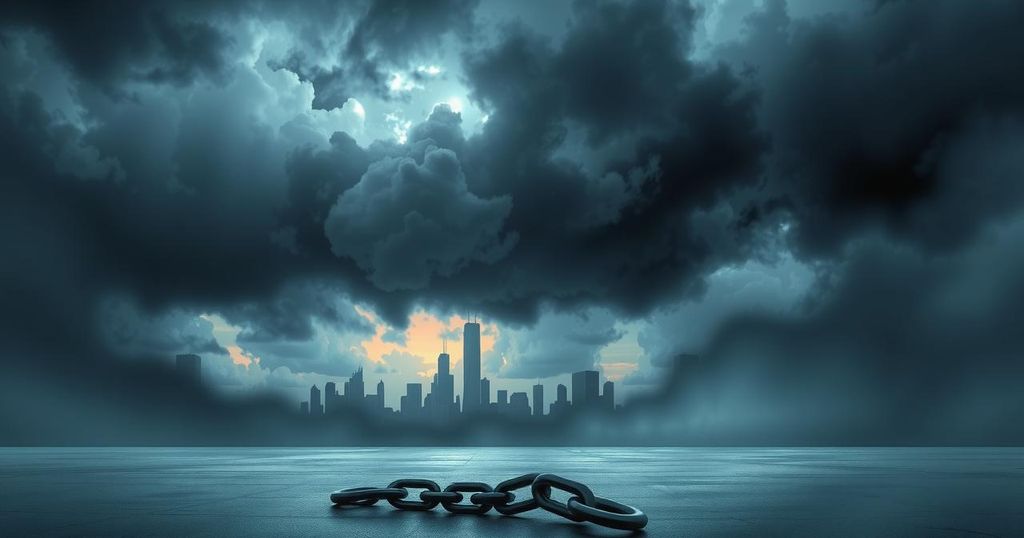World news
ASIA, BIDEN, CATO INSTITUTE, COLOMBIA, CUBA, HUMAN RIGHTS WATCH, JUAN, LATIN AMERICA, MADURO, MEXICO, NATIONAL INSTITUTE OF JUSTICE, NATIONAL SECURITY, NORTH AMERICA, ORGANIZED CRIME, PHILIPPINES, POLITICS, SOCIAL ISSUES, SOUTH AMERICA, STATE DEPARTMENT, TRI, TRICIA MCLAUGHLIN, TRUMP ADMINISTRATION, U.S. ELECTIONS, VENEZUELA
Fatima Alavi
0 Comments
Supreme Court Ruling on Venezuelan Deportations Raises Concerns Over Safety and Family Separation
The Trump administration’s Supreme Court victory allows the deportation of 350,000 Venezuelans, despite most being law-abiding individuals contributing to society. Critics argue this will uproot families, make communities less safe, and ignore the dangers these deportees face in Venezuela. Experts warn that these actions are politically motivated and risk a humanitarian disaster.
The recent Supreme Court ruling that enables the Trump administration to proceed with the deportation of 350,000 Venezuelans has sparked outrage. Many of these individuals are contributing positively to American society, yet they are being sent back to a country the State Department has labeled a “dangerous, crime-ridden dictatorship.” This decision is causing considerable anxiety, as it threatens to uproot families and destabilize the workforce in the service sector, where many Venezuelans are employed.
Homeland Security spokesperson Tricia McLaughlin hailed the ruling as a victory for safety in American communities. However, critics assert that this perspective is misguided. The vast majority of Venezuelans facing deportation are persona non grata in their home country due to political unrest and economic collapse, and studies indicate that immigrants generally commit fewer violent crimes than U.S.-born citizens. The notion that the deportations will create safer environments is thus highly questionable.
This emergency ruling from the Supreme Court also revokes the legal protections under the Temporary Protected Status program that had kept many Venezuelans safe from deportation amid a debilitating crisis back home. Just days before the ruling, the State Department emphasized the high risks associated with travel to Venezuela, warning Americans that they could face wrongful detentions and threats to their personal safety.
Venezuela is grappling with staggering violence, highlighted by an annual homicide rate that surpasses those of Colombia and Mexico, according to the Venezuela Observatory of Violence. With reports of escalating political repression since President Maduro’s contested re-election, the urgency of protecting those fleeing this turmoil becomes clearer.
Human Rights Watch has noted the alarming consequences of these deportations. Juanita Goebertus, who leads HRW’s Latin America division, characterizes the ruling as “a huge act of treason,” emphasizing the peril that former political dissidents would face upon return. Many of the Venezuelans slated for deportation have openly protested against Maduro’s government and now face potential arrests and torture.
Additionally, the fears surrounding these deportations extend to American families. Helen Villalonga, from the AMAVEX Venezuelan immigrant rights group, shared a distressing story of a family facing forced separation due to the deportations. She highlighted the absurdity of deporting a 9-year-old U.S. citizen to a country deemed unsafe by the State Department.
As the community grapples with this reality, the fear of retaliation against immigrants looms large. The potential for reduced reporting of crimes or further victimization within immigrant communities could compromise safety rather than enhance it. While many agree that individuals who commit crimes should face consequences, this situation is different—it involves innocent families who deserve a chance at protection from tyranny.
Critics further argue that the Trump administration’s actions are not motivated solely by safety concerns but are rather an attempt to galvanize support from xenophobic factions within his base, diverting attention from broader economic issues. Ultimately, this political theater risks creating a humanitarian crisis that reverberates throughout the country.
In summary, the Supreme Court’s ruling permitting the deportation of Venezuelans threatens to displace countless families and exacerbate fears within immigrant communities. Amid increasing violence and repression in Venezuela, critics argue that this decision is not a step toward safety, but rather a misguided policy that feeds political agendas while risking humanitarian fallout. The situation demands much closer scrutiny and compassion, as these deportations could disrupt lives and communities on numerous levels.
Original Source: www.miamiherald.com




Post Comment